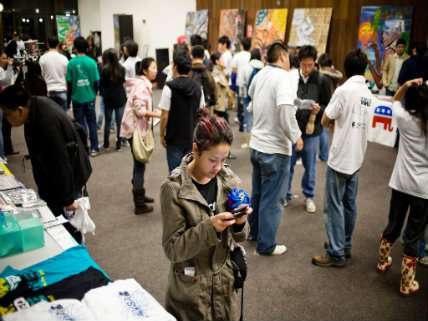Are Voters Too Sensitive to 'Microaggressions?'
Professors say Republican 'microaggressions' have pushed Asian Americans to vote Democrat.

In a recent piece in Politico titled "Why Are Asian Americans Democrats?" professors Alexander Kuo, Neil Malhotra, and Cecilia Hyunjung Mo make the contention that "microaggressions" and social exclusion have pushed the entire Asian-American community to vote for the Democratic Party.
If you're unfamiliar with the term, microaggressions, according to Fordham University, "are common verbal, behavioral, and environmental indignities, whether intentional or unintentional, that communicate hostile or negative slights to marginalized groups."
The professors begin their microcase by pointing to a recent exchange between Sen. Pat Roberts (R-Kansas) and President Barack Obama's nominee for surgeon general, Vivek Murthy, an Indian-American. Roberts invited Murthy to his state to meet a "lovely doctor from India. She's in her mid-30s and she's highly respected by the community. … And so, I think you'd be right at home, and we would welcome you."
This clumsy statement allegedly proves that Republicans have it in for Indian-Americans. As the authors explain: "However harmless it might seem, this is exactly the sort of exchange that makes Asian-Americans— the fastest growing ethnic group in the country—more likely to identify themselves as Democrats than Republicans, and by stunning margins."
Actually, it is harmless. Just as harmless as this line delivered by Vice President Joe Biden a few years back: "In Delaware, you cannot go to a 7-11 or a Dunkin' Donuts unless you have a slight Indian accent. I'm not joking."
The professors didn't see fit to mention Joe. It might have proven that the GOP doesn't have a monopoly on obtuse white guys. And when I searched for another example of a high-profile GOP politician smearing Indian-Americans with slurs like "lovely doctor" and "highly respected," I came up empty.
As it turns out, the problem is a more subtle one. Asking questions like, "where were you born?" has the propensity to turn people into Democrats, as well. Evidently, Asian-Americans have the extraordinary ability to discern the ideological affiliation of every person querying them. These racial "microaggressions," claim the authors, are "sadly common and carry the implied message that Asian Americans are not true Americans."
Foreign accents and unique features can arouse curiosity in people. You have to develop an impressive hypersensitivity to believe that asking people about their background infers that "you're not a real American"—whatever that means. But even if it were, so what? Why are we so distressed about the microhostility of strangers? Why do we have to be profoundly offended by every oblivious comment? Do dumb questions erect barriers to the progress of your community? More specifically, is there some conservative policy that aims to undermine the Asian-American experience?
Near the end of the piece we get to the real purpose of the so-called science. They don't like your tone. The authors ask: "What can the GOP do to win them back?"
The answer, you will not be surprised to learn, is to be more liberal. There is no doubt that Republicans are perceived as the party of immigration restrictions (for good reason), and that turns off many minority voters. It can also be argued that the GOP is also a party that is far more likely to celebrate and foster the merit-based success on which the Asian community thrives. (Though I should point out that making assumptions about Asian-Americans as a "model" minority is also considered microaggression.) And maybe one day the GOP will make that compelling case.
But it's difficult to believe that Asian Americans, as the professors maintain, believe half the country is out to marginalize them with a bunch of subtle insinuations. In our real-world interactions, we're just not that sensitive. We shouldn't be that sensitive in our politics, either.


Show Comments (165)